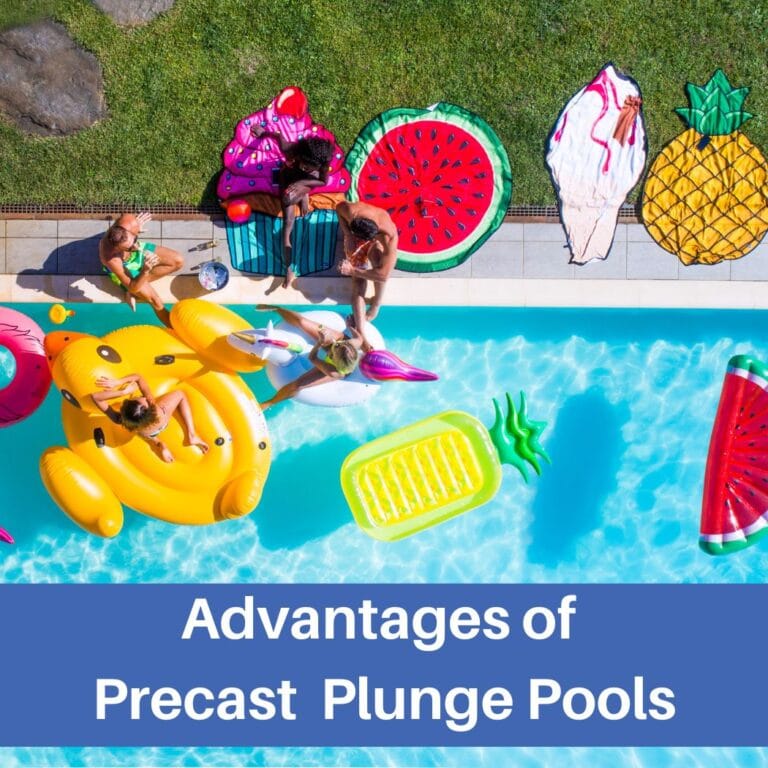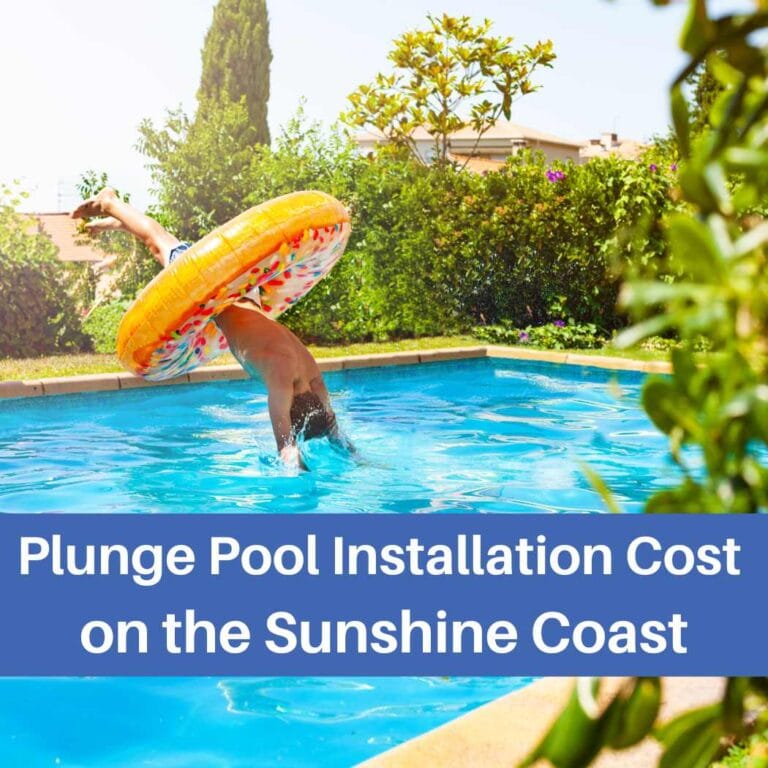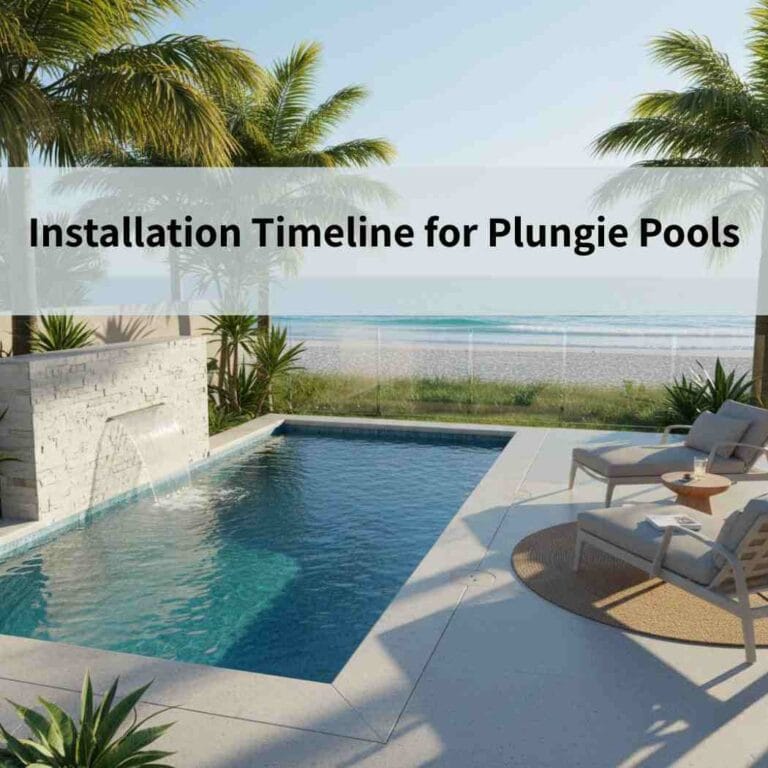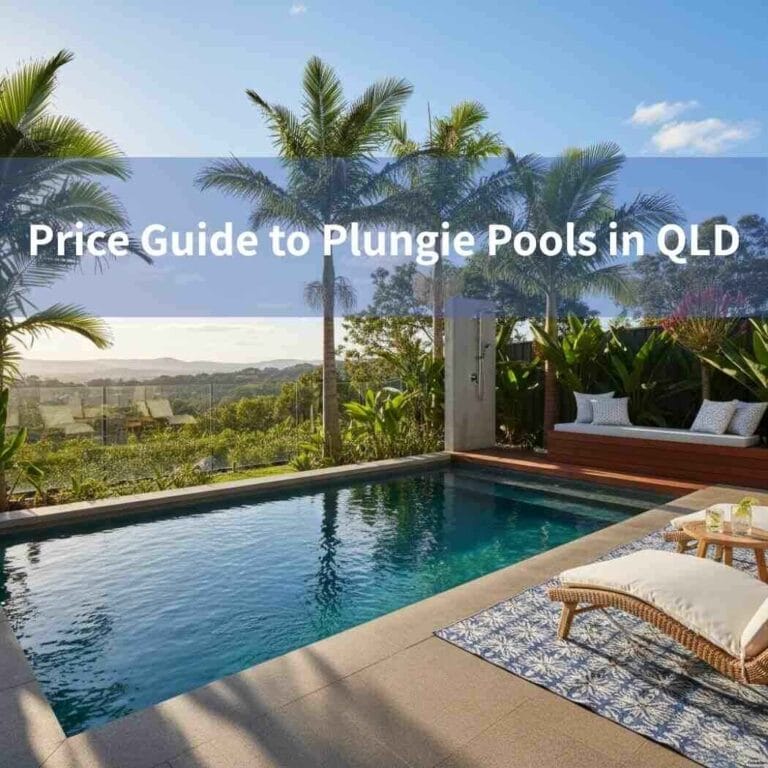At Plunge Pools Sunshine Coast, we’ve spent years helping locals choose the right pool for their lifestyle and property goals. From portable models you can enjoy straight away to custom permanent pools that lift property appeal, we know how to match the right option to your needs.
In this guide, we’ll compare portable and permanent plunge pools in simple terms. You’ll see the key differences in council approvals, site impact, flexibility, and resale value, so you can decide whether a plunge pool should be a quick backyard upgrade or a long-term asset for your home.
Table of Contents
ToggleOwnership Horizon & Why It Matters
If you’ll sell within 3–5 years, a portable plunge pool protects resale value because buyers see it as a removable accessory. If you’ll stay 10+ years, a permanent plunge pool often adds luxury appeal and boosts property value, especially in Sunshine Coast’s lifestyle-focused housing market.
When deciding between a portable or permanent plunge pool, your ownership horizon plays a big role in resale value impact.
- Short-term owners (3–5 years): A portable plunge pool gives you the fun of a pool without locking your property into long-term maintenance. Buyers on the Sunshine Coast often prefer flexibility especially younger families or downsizers, so a removable pool won’t reduce your buyer pool. It protects your resale value by keeping your home neutral and easy to sell.
- Long-term owners (10+ years): A permanent plunge pool is more like a capital improvement, similar to a new kitchen or deck. It can raise appraisal value and attract lifestyle-driven buyers who see it as a luxury upgrade. On the Sunshine Coast, where outdoor living is prized, a built-in pool can be a strong selling point for high-value homes.
In short, think about how long you’ll own the property, how much you want to invest in maintenance, and whether you want your pool to act as a resale asset or a short-term accessory.
Do Permanent Plunge Pools Add Value To Your Property?
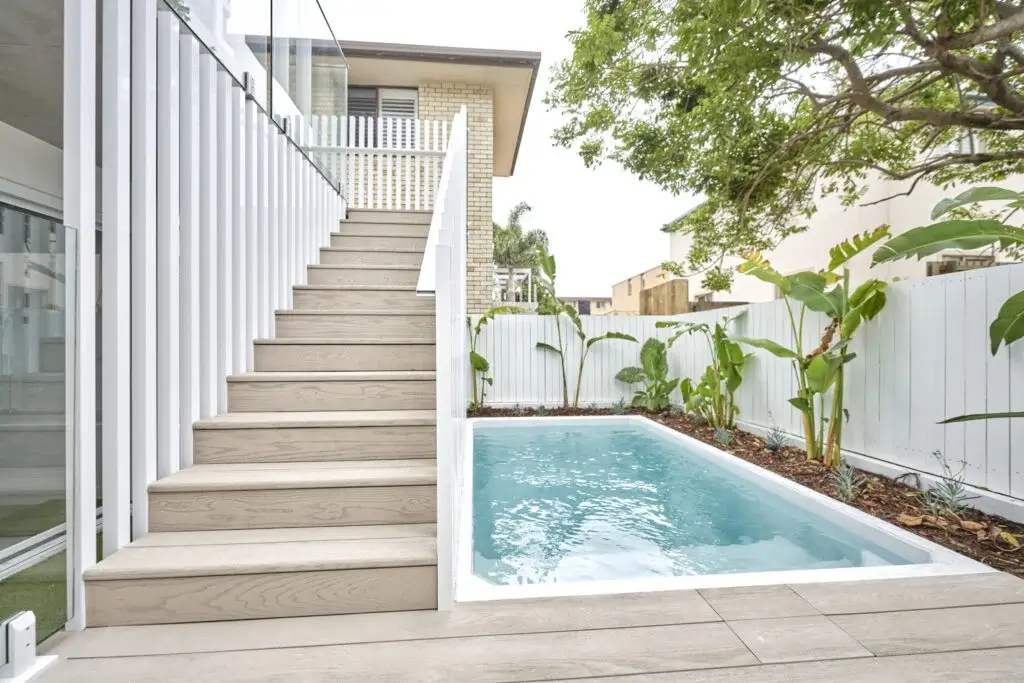
Permanent plunge pools need council approval and excavation but create a seamless, built-in feature. They’re treated as a capital improvement that can boost property value on the Sunshine Coast, though they may narrow your buyer pool to those who want ongoing pool ownership.
- Permits & Compliance
- Needs council approval in Queensland plus inspections.
- Treated like other fixed home upgrades (deck, extension, outdoor kitchen).
- Must follow safety regulations, fencing laws, and building codes.
- Site Impact & Excavation
- Involves digging and structural work, which can disrupt landscaping.
- Once complete, the pool looks like a permanent part of the yard.
- Creates a seamless backyard design that blends with outdoor living.
- Asset Permanence
- Considered a capital improvement, similar to a kitchen or bathroom renovation.
- Can lift your home’s appraisal value and make it stand out in the Sunshine Coast property market.
- Appeals to buyers who want a ready-made luxury feature.
- Resale Optics & Risks
- Many buyers view permanent pools as a status upgrade.
- Some see them as extra work and higher maintenance.
- Can boost property value but may also reduce buyer pool if not everyone wants a pool.
A permanent plunge pool is a commitment. It takes more time and cost upfront but rewards you with a luxury feature that becomes part of your home. If your goal is long-term value and lifestyle appeal, it can be one of the best upgrades you make.
What Are The Benefits Of Portable Plunge Pools?
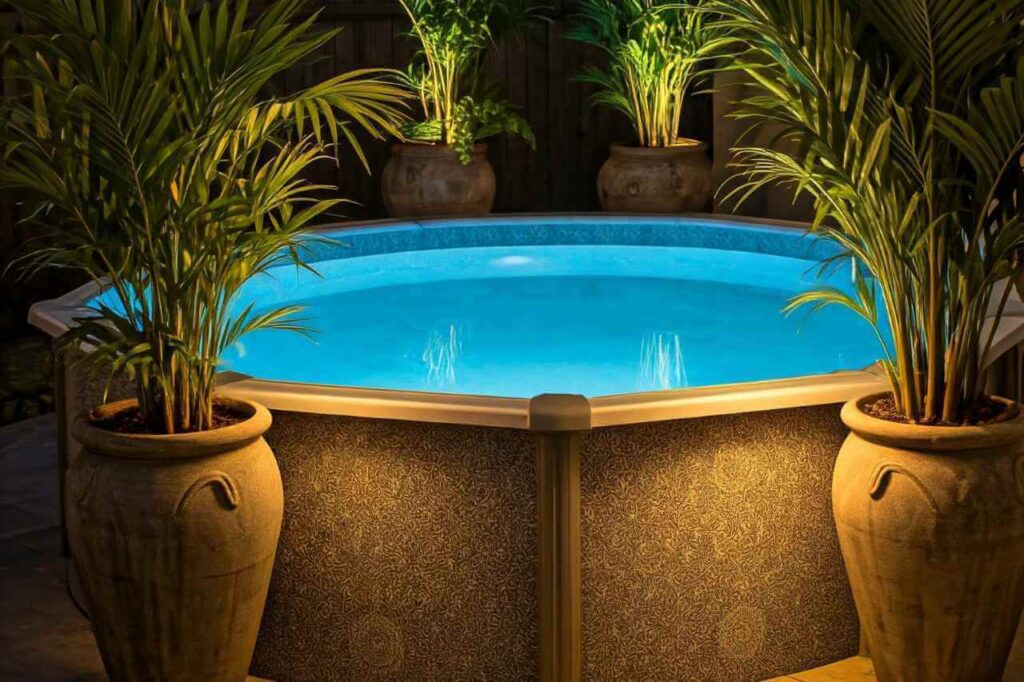
Portable plunge pools need little to no excavation and often fewer approvals. They can be moved or removed when you sell, making them a flexible choice for Sunshine Coast homeowners who want enjoyment now without affecting resale value.
- Minimal Site Impact
- Usually sit above-ground or semi-inground, so no major excavation.
- Your garden and landscaping stay mostly untouched.
- Faster installation compared to permanent pools.
- Approvals & Compliance
- Many portable plunge pools need fewer council approvals in Queensland.
- If the pool is shallow and doesn’t involve heavy digging, setup is often faster and easier.
- Pools deeper than 300mm may still require fencing and a safety certificate.
- Relocation & Removal
- Biggest advantage: you can take it with you when you move.
- If you sell, you can remove the pool, leaving the property neutral for buyers.
- Protects resale flexibility since buyers see it as an accessory, not a fixed asset.
- Resale Optics
- Seen more like a backyard feature, similar to outdoor furniture or a spa.
- Doesn’t usually affect property appraisal value.
- Appeals to buyers who want the home without long-term maintenance obligations.
Portable plunge pools are best if you value freedom and flexibility. They give you all the fun of a pool without tying your property down. For many Sunshine Coast families, they’re the perfect way to enjoy a backyard pool now while keeping future resale simple.
Maintenance Burden & Transferability
Permanent plunge pools transfer to the new homeowner as a fixed asset. Portable plunge pools end your responsibility when you move, remove, or relocate them making them the lighter option for resale on the Sunshine Coast.
- Permanent Plunge Pools
- Once installed, they become part of the property title.
- Ongoing pool maintenance; cleaning, water balancing, and equipment checks, transfers to the new homeowner.
- Seen as a fixed asset, like a roof or driveway, which adds value for some buyers but can deter those who don’t want long-term upkeep.
- Adds to insurance obligations, since the pool is part of the home’s structure.
- Portable Plunge Pools
- Your responsibility ends when you move, sell, or remove the pool.
- Treated more like personal property or equipment, not a structural asset.
- Gives sellers more resale flexibility, as the home can be presented without a pool if buyers prefer low maintenance.
- Can be relocated to your next home, protecting your investment.
Buyers on the Sunshine Coast often think about the long-term commitment a pool represents. A permanent plunge pool signals luxury but also ongoing care. A portable plunge pool signals flexibility, letting you enjoy backyard swimming without leaving future owners tied to maintenance.
Which Plunge Pool Is Better For Short-Term vs Long-Term Owners?
Portable plunge pools suit short-term owners who want low site impact and easy resale. Permanent plunge pools suit long-term owners looking for a capital improvement that may boost property value but comes with higher cost and maintenance.
Quick Comparisons:
| Feature / Factor | Portable Plunge Pool | Permanent Plunge Pool |
|---|---|---|
| Approvals | Fewer approvals in Queensland if shallow; deeper than 300mm still needs fencing & safety certificate | Requires council approval, inspections, and compliance with building codes |
| Installation & Cost | Lower upfront cost, minimal excavation, faster setup | Higher upfront cost, excavation and structural work, longer timelines |
| Site Impact | Sits above-ground or semi-inground; landscaping mostly untouched | Excavation disrupts garden and yard, but creates seamless integration |
| Resale Value Impact | Seen as an accessory; doesn’t affect property appraisal value | Treated as a capital improvement; may raise appraisal value but narrows buyer pool |
| Flexibility | Can be removed or relocated; protects resale neutrality | Fixed in place; becomes a permanent part of the property |
| Buyer Appeal | Appeals to buyers who want low maintenance and flexibility | Appeals to buyers seeking luxury and lifestyle upgrades |
| Insurance | Often treated as equipment or temporary structure; lower premiums | Adds to home insurance premiums as a permanent structure |
When weighing up portable vs permanent plunge pools, it helps to line up the main factors side by side
- Short-term owners: A portable plunge pool is usually the safer bet. It protects your resale flexibility because you can remove it or take it with you when selling. With fewer council approvals and minimal site work, it’s cheaper and quicker to enjoy. Buyers on the Sunshine Coast often see it as a bonus feature without added responsibility.
- Long-term owners: A permanent plunge pool works more like an investment in your home. Treated as a capital upgrade, it can boost appraisal value and attract lifestyle-driven buyers. But it also raises insurance costs and demands regular upkeep, which may deter some buyers.
In short: portable equals freedom and low impact; permanent equals commitment and potential value uplift.
Insurance & Liability Differences
Permanent plunge pools usually raise insurance premiums because they’re treated as permanent structures. Portable plunge pools may be covered as equipment or temporary features, often costing less depending on your insurer.
| Factor | Portable Plunge Pool | Permanent Plunge Pool |
|---|---|---|
| Insurance Category | Often treated as equipment or a temporary structure | Treated as a permanent structure under home insurance |
| Premium Impact | May not raise premiums significantly; depends on provider | Typically increases premiums due to liability and maintenance risks |
| Liability Risks | Lower liability since it can be removed; may still need fencing compliance if deeper than 300mm | Higher liability exposure; strict compliance with fencing, safety, and building codes |
| Coverage Flexibility | Easier to adjust coverage if moved or removed | Locked into policy as long as the pool exists on the property |
| Council & Compliance | Some exemptions if shallow, but safety rules still apply | Must meet Queensland pool safety standards, inspections, and compliance |
- Permanent plunge pools are considered fixed structures. This usually means your property insurance premiums go up because insurers see them as higher risk. They bring added liability exposure like pool accidents and require full compliance with Queensland pool safety standards, fencing laws, and inspections.
- Portable plunge pools often fall into a different category, sometimes treated as equipment or a temporary feature. This can mean lower or different insurance costs. Still, if the pool is deeper than 300mm, fencing and safety certificates are required by law, so owners must factor that in.
Quick tip: Always check with your insurer before installation. Knowing how your pool will be categorised upfront helps you budget for the true cost of ownership.
Market Trends in Resale Value
On the Sunshine Coast, permanent plunge pools still signal luxury in the property market, but younger buyers and downsizers are leaning towards portable plunge pools for their low maintenance and flexibility.
Comparison Table
| Buyer Segment | Preference | Reasoning / Trend |
|---|---|---|
| Long-term homeowners | Permanent plunge pools | Seen as a luxury feature that boosts lifestyle and property appeal |
| Younger buyers | Portable plunge pools | Value flexibility and lower maintenance burden |
| Downsizers / retirees | Portable plunge pools | Prefer simple, low-upkeep features that don’t complicate resale |
| Investors / developers | Permanent plunge pools (selectively) | Can raise appraisal value and marketability if targeting high-end buyers |
| General market trend | Split demand | Lifestyle-driven buyers want permanence, while cost- and flexibility-driven buyers lean portable |
On the Sunshine Coast, real estate trends show a split in buyer demand when it comes to plunge pools.
- Permanent plunge pools remain attractive to many long-term homeowners. They’re seen as capital upgrades that add a sense of luxury and help a property stand out. For high-value homes or lifestyle-driven buyers, a built-in pool can be a strong selling point.
- Portable plunge pools, however, are growing in popularity. Younger buyers and downsizers often prioritise low maintenance, affordability, and flexibility. For them, the appeal lies in enjoying a pool now without being locked into upkeep or affecting resale value later.
- Property investors and developers sometimes favour permanent plunge pools if they’re targeting the premium market, where outdoor living spaces drive higher appraisals. But in mid-range homes, the flexibility of portable pools may better match changing buyer expectations.
Overall, buyer demand is shifting. Permanent pools still symbolise luxury and lifestyle, but portable options are carving out their space in the Sunshine Coast housing market as a smarter choice for flexible living.
How Do You Choose Between A Portable And Permanent Plunge Pool?
If resale value is your priority, choose a permanent plunge pool. If flexibility matters more, a portable plunge pool is the better option. Your decision should align with property goals, ownership horizon, and lifestyle needs on the Sunshine Coast.
Here’s your checklist that you can follow:
- Planning to sell within 5 years? – A portable plunge pool protects resale flexibility.
- Staying 10+ years and want long-term value? – A permanent plunge pool boosts property resale appeal.
- Unsure of long-term plans? – Portable plunge pool offers flexibility while protecting future resale neutrality.
- Want your pool to raise property value? – Permanent plunge pool is treated as a capital improvement in the real estate market.
- Love changing up your backyard often? – Portable plunge pool lets you adapt your outdoor space without affecting resale outcomes.
Always anchor your decision in your property goals, not just pool preference.
What Lifestyle Factors Should You Consider When Choosing A Plunge Pool?
Portable plunge pools suit families who want quick relaxation without long-term upkeep. Permanent plunge pools suit homeowners who want a luxury feature integrated into their backyard design and property value.
- Relaxation & Everyday Use
- Portable plunge pools are ready to enjoy faster after delivery.
- Great for families, entertainers, or busy homeowners who want instant cooling off.
- Less disruption to your landscaping and outdoor design.
- Luxury & Lifestyle Appeal
- Permanent plunge pools blend into your backyard landscaping as a central feature.
- They signal luxury living on the Sunshine Coast and can improve resale value.
- Customisation options include built-in seating, steps, and integration with outdoor kitchens.
- Design Flexibility
- Portable pools often offer spa-style features, like jets or heaters, which can be upgraded or swapped.
- Permanent pools allow for bespoke designs, shaping the pool to your space with more landscaping control.
- Alternative Options
- Some homeowners choose a swim spa, which combines exercise and relaxation at a lower cost.
- Downsizers or younger buyers may prefer a portable pool as a budget-friendly way to add water features without heavy construction.
- Maintenance Considerations
- Both pool types require regular cleaning, filter care, and chemical balancing.
- Portable pools are usually smaller, so water upkeep is faster.
- Permanent pools demand more consistent maintenance but reward you with long-term design integration.
Both options require ongoing care filters, chemicals, and safety checks, but portable pools are usually smaller and quicker to maintain, while permanent pools demand more effort but give you a high-end, integrated look.
At the end of the day, your choice isn’t just about resale value. It’s also about whether you want your pool to be a flexible accessory or a luxury centrepiece of your lifestyle.
Conclusion
In the end, the choice comes down to your property goals. Permanent pools attract buyers who want prestige and design integration. Portable pools appeal to families and downsizers who want the fun of a pool without the long-term ties.
At Plunge Pools Sunshine Coast, we help homeowners match the right option to their needs. Whether you’re leaning toward a permanent upgrade or a portable choice, our team can guide you through approvals, installation, and design to make sure your pool suits both your lifestyle and your future plans.
Ready to explore your options? Contact us today and let’s design the pool that fits your goals, your lifestyle, and your home.
FAQs
Are council permits required for portable plunge pools in Queensland?
In most cases, portable plunge pools on the Sunshine Coast need fewer approvals than permanent ones, but some council rules still apply. For example, pools deeper than 300mm usually require a safety certificate and compliant fencing. It’s always best to check with your local council before installation
Can I move a portable plunge pool if I sell my house?
Yes, portable plunge pools can be moved when you sell your home, giving you the flexibility to take your investment with you. Many homeowners see this as an advantage because it keeps their property neutral for buyers while still enjoying a pool at their next home.
Do portable plunge pools need the same maintenance as permanent pools?
Portable plunge pools need regular cleaning and water treatment, just like permanent pools. The main difference is that portable models are often smaller, so water balancing and filter upkeep may be quicker and easier. Both types still require safe chemical levels and routine checks.
What design flexibility and customisation options are available for portable vs permanent plunge pools?
Permanent plunge pools offer more design flexibility, such as custom shapes, built-in seating, or integration with landscaping. Portable plunge pools are limited in size and shape but can include upgrades like spa jets or heating. The right choice depends on whether you value long-term customisation or easy installation.
Are there energy-efficient or eco-friendly plunge pool choices for Sunshine Coast homes?
Yes, both portable and permanent plunge pools now come with eco-friendly options such as energy-efficient pumps, solar heating, and water-saving filters. Many Sunshine Coast homeowners also choose smaller plunge pools because they use less water and chemicals compared to full-sized pools.
Will future buyers prefer portable plunge pools over permanent ones as housing trends change?
Future buyers may lean towards portable plunge pools if flexibility and low maintenance continue to be top priorities. However, permanent plunge pools will likely remain attractive to those seeking a luxury backyard upgrade. Local property trends and lifestyle preferences will shape buyer demand over time.

